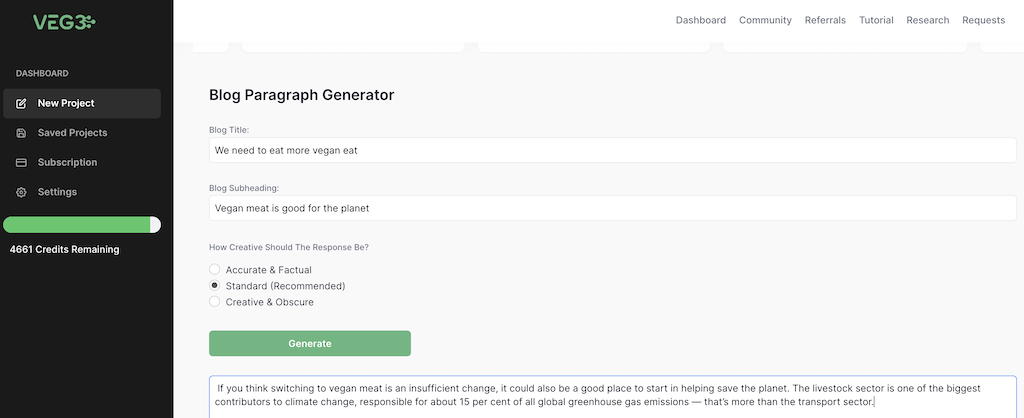4 Mins Read
VEG3, a New Zealand-based company, has announced the release of what they describe as the “world’s first artificial intelligence marketing assistant for vegans”. In the future, will AI tools replace content writers?
The AI-powered software is capable of creating all kinds of content formats, from blog paragraphs to emails to press releases to social media posts- and all this in just a few seconds. All you need to do is prompt it with a keyword or a subject matter. The tool can even create complete vegan recipes and respond to anti-vegan comments with ready-to-post arguments.
It’s deceptively simple to use, and even the most web-challenged folks should be able to manage. “We’ve worked hard to make VEG3 easy to use, even for non-technical users”, explains Sam Tucker, founder of VEG3. “There’s no programming involved and you don’t need any experience using an AI tool.”
It takes just a couple of minutes to sign up for a free account, which gives you 5,000 credits a month, or about 3,000 words of copy. Beyond that, plans go from $39 a month to $499 a month. The software is currently in its beta version and prices reflect the launch period.
“VEG3 was trained on tens of thousands of examples of marketing copy from plant-based businesses and animal rights charities, so it’s capable of writing a wide range of different types of content” says Tucker, who build the software himself.
We took the tool for a test drive and were relatively impressed with the results. While the output will likely not win a Pulitzer anytime soon, the tool is fairly robust.
We input “We need to eat more vegan meat” into a Blog Paragraph Generator, and within 15 seconds, the tool generated the following text as shown in the screenshot below.
One controversial feature is the choice of ‘how creative’ the tool’s generated content can be. Users can select for their response to be ‘Accurate & Factual’, ‘Standard (Recommended)’, or ‘Creative & Obscure’. Are options 2 and 3 open to be interpreted as less factual? It’s unclear. We tested all three. Below we share the results. Reassuringly, neither of the three seems like fake news.

The results for ‘Accurate & Factual’:
“Nutritionally, vegan meat is much more valuable than chicken. Chicken has very little protein compared to other meats and it’s not a good source of any amino acids — plant proteins our bodies need. So most chicken protein comes from soybeans, which are a complete source of dietary protein, cutting down on several steps in the food chain (and chickens). The soybean industry uses 20 times as much land and emits 190 times more carbon dioxide than poultry production. Yowzer! Plus, the UPside Partnership estimates that you save 113 grams of CO2 emissions for every 1,000 calories consumed when topping grains instead of eating beef or chicken.”
The results for ‘Creative & Obscure’:
“Livestock production is one of the largest contributors to climate change. As demand for meat continues to grow, so does greenhouse gas emissions and air pollution. Plant-based foods have the potential to tackle these issues as they require less land, emit less methane and require fewer resources than traditional animal proteins. Furthermore, research suggests that a ‘protein transition’ towards more vegetarian food could reduce global greenhouse gas emissions by 18%— this equates to about two thirds of what needs to be done globally.”
Green Queen reached out to Tucker to explain what the differences between the three were and here is what he told us: “Basically ‘Accurate & Factual’ means the AI will generate content that is closer to the type of content that exists in the database it was trained on, and ‘Creative & Obscure’ means the AI will generate content that is less like the type of content it was trained on. ‘Creative & Obscure’ is best for brainstorming creative ideas, ‘accurate & factual’ is best for reducing the likelihood of mistakes and ‘Standard’ is a balanced approach that tries to get the best of both worlds.”
The last few weeks have seen a host of AI art generation software released, from DALL-E to Google Imagen, and pundits are questioning what this means for the future of digital art. Who does the work belong to? Are there royalties involved? What does this mean for human artists? As Abbey Bamford asks in Design Week in a piece about whether these tools represent a thread for the design community: “Could we possibly artificially codify and implement the messy, organic, chaotic process of creativity?”
These questions will no doubt come up for written content creators too. If social media posts and blog articles can be reliably written by an algorithm, how will journalists and writers differentiate themselves?
According to a press release, VEG3 will be adding a host of new features over the next few months and will continue to train its artificial intelligence models based on feedback collected during the beta testing phase.
“We expect that our tools will not only be able to help you with writing your marketing copy today, but will also be able to automate a much wider range of marketing tasks in the near future” adds Tucker.
“Ultimately, the goal is to make VEG3 the only marketing tool you need to run a successful plant-based business.”
Lead image courtesy of Canva.





